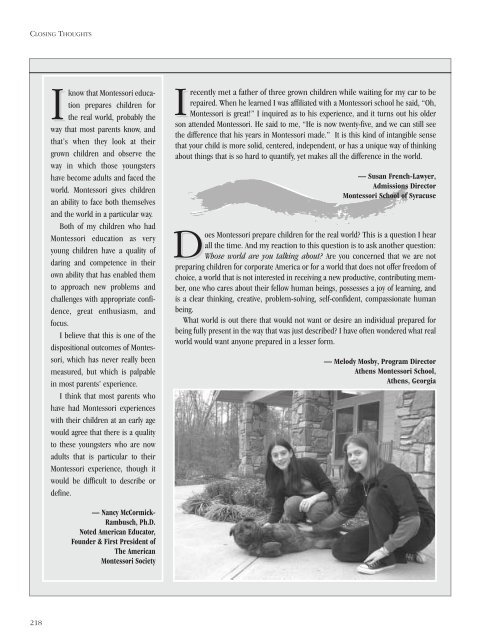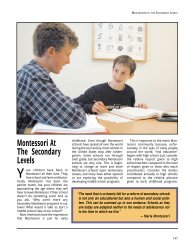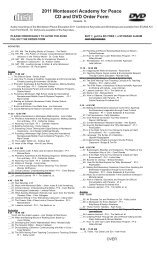Tim Seldin & Paul Epstein Ph.D. An Education for Life
Tim Seldin & Paul Epstein Ph.D. An Education for Life
Tim Seldin & Paul Epstein Ph.D. An Education for Life
You also want an ePaper? Increase the reach of your titles
YUMPU automatically turns print PDFs into web optimized ePapers that Google loves.
CLOSING THOUGHTS<br />
218<br />
Iknow that Montessori education<br />
prepares children <strong>for</strong><br />
the real world, probably the<br />
way that most parents know, and<br />
that’s when they look at their<br />
grown children and observe the<br />
way in which those youngsters<br />
have become adults and faced the<br />
world. Montessori gives children<br />
an ability to face both themselves<br />
and the world in a particular way.<br />
Both of my children who had<br />
Montessori education as very<br />
young children have a quality of<br />
daring and competence in their<br />
own ability that has enabled them<br />
to approach new problems and<br />
challenges with appropriate confidence,<br />
great enthusiasm, and<br />
focus.<br />
I believe that this is one of the<br />
dispositional outcomes of Montessori,<br />
which has never really been<br />
measured, but which is palpable<br />
in most parents’ experience.<br />
I think that most parents who<br />
have had Montessori experiences<br />
with their children at an early age<br />
would agree that there is a quality<br />
to these youngsters who are now<br />
adults that is particular to their<br />
Montessori experience, though it<br />
would be difficult to describe or<br />
define.<br />
— Nancy McCormick-<br />
Rambusch, <strong>Ph</strong>.D.<br />
Noted American Educator,<br />
Founder & First President of<br />
The American<br />
Montessori Society<br />
Irecently met a father of three grown children while waiting <strong>for</strong> my car to be<br />
repaired. When he learned I was affiliated with a Montessori school he said, “Oh,<br />
Montessori is great!” I inquired as to his experience, and it turns out his older<br />
son attended Montessori. He said to me, “He is now twenty-five, and we can still see<br />
the difference that his years in Montessori made.” It is this kind of intangible sense<br />
that your child is more solid, centered, independent, or has a unique way of thinking<br />
about things that is so hard to quantify, yet makes all the difference in the world.<br />
— Susan French-Lawyer,<br />
Admissions Director<br />
Montessori School of Syracuse<br />
Does Montessori prepare children <strong>for</strong> the real world? This is a question I hear<br />
all the time. <strong>An</strong>d my reaction to this question is to ask another question:<br />
Whose world are you talking about? Are you concerned that we are not<br />
preparing children <strong>for</strong> corporate America or <strong>for</strong> a world that does not offer freedom of<br />
choice, a world that is not interested in receiving a new productive, contributing member,<br />
one who cares about their fellow human beings, possesses a joy of learning, and<br />
is a clear thinking, creative, problem-solving, self-confident, compassionate human<br />
being.<br />
What world is out there that would not want or desire an individual prepared <strong>for</strong><br />
being fully present in the way that was just described? I have often wondered what real<br />
world would want anyone prepared in a lesser <strong>for</strong>m.<br />
— Melody Mosby, Program Director<br />
Athens Montessori School,<br />
Athens, Georgia




